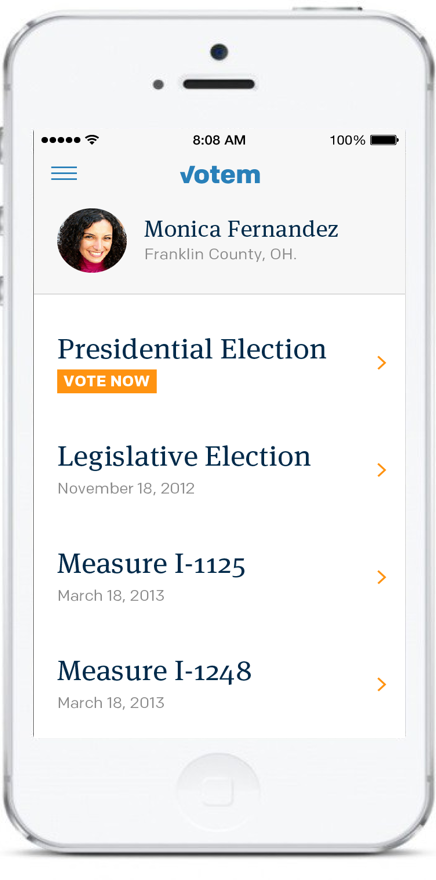Calling all Voters! Digital Democracy is Just a Smartphone Away
- Krista Vachon
- No Comments
In today’s high-tech society, it seems everywhere we look people’s hands have a protective grip on one thing; their smartphones. We coddle our precious phones as if they were delicate little babies and do everything from changing their attire to purchasing insurance to keep them safe. But aside from texting our favorite aunt and trying to beat the next level in Candy Crush Saga, what else can our prized, digital children actually do for us?
We are creatures of convenience and with that, some believe our smartphones have the ability to transform our country as we know it. Our pocket babies have the untapped potential to become our own personal voting booths. As scary as that may sound to traditionalists, Estonia has already successfully beat us to the punch.

Abhay K, award-winning poet and diplomat reports that, Estonia has allowed e-voting since 2005, making it the first country in the world to do so.
“The mobile operator EMT has created the world’s first mobile identification service in Estonia, making it possible to vote via mobile phone. In the 2011 parliamentary elections, approximately 25% of Estonians voted via the internet.”
While Estonian election officials praise their revolutionary way of voting, some computer security experts warn that any voting system which transmits voted ballots electronically cannot be trusted, Charles Arthur, contributing writer for the Guardian reports.
In May 2014, a group of international computer security experts found they could breach the system, change votes and vote totals and quietly sneak away like a ninja in the night leaving no evidence behind. Despite these deviant little hackers, the Estonians wholeheartedly trust their system and approximately 30.5% of participants pulled out their phones to cast their votes in the 2015 parliamentary elections.
In America, mobile voting is a needed expediency. Political analyst and reporter in Washington D.C., Colin Campbell said, “It was reported that during the last election cycle, voter turnout was the lowest since World War II. That’s pretty frickin’ low dude!”
Only a mere 36.4% of voting-eligible Americans cast ballots, leaving an alarming 63.6% twiddling their thumbs.
“Although it’s not known whether the myriad reasons were inconvenience or not, it stands to reason that if the process was made easier, more people would care to participate,” Campbell states.
I myself am an avid voter and procrastinator. In fact, I remember quite vividly during the last presidential election I was running around like a madwomen trying to drop off my ballot before the deadline. Normally, this wouldn’t be an issue, but surprise, surprise; I didn’t walk my mail-in-ballot to the box in time. The sad thing is, my mail box is right outside of my door! Come to think of it, I had to drop of my mother’s ballot as well. It came down to the wire, fighting traffic and ending with a parking lot standoff for a spot so I could run inside and drop it off before the cutoff time. Needless to say, I made it, barely.
“Mobile voting has an opportunity to revolutionize the voting process so that more voices are being heard,” says Campbell.

Some of the potential benefits mobile voting can have in the United States is it may increase the number of younger voters. In the midst of a changing society, technology is a much larger part of a young adult’s life today, as opposed to those who grew up in the 80’s whose version of a smartphone was an encrypted message flashing across a tiny pager screen.
However, the older generation, such as my grandma, doesn’t even own a cell phone. She is a hardcore traditionalist who, to this day, will head down to the old-style voting polls in her small town, decked out in red, white and blue attire to cast her vote. I can almost hear ‘Hail to the Chief’ blaring from the phonograph as she approaches the voting booth.
Another potential benefit to cell phone voting is that it is a less expensive solution overall and can potentially engage more people in the political process. Debates have been tossed around as to whether voting day should be observed as a national holiday, which for some businesses, particularly small ones, could potentially be a financial inconvenience. Allowing voters to use their smartphones, employees could report for work while still engaging in the voting process.
“The ramifications are even higher for those less ambulatory. They could vote from wherever they are without worrying about sending in mail-in-ballots,” Campbell says.
“I think mobile voting would allow those who feel disenfranchised by the voting process to feel more empowered. I also think there would be fewer tendencies for life-long politicians. There would be a quicker turnaround for changeover from incumbents. Of course this would mean a more fluid reaction to changing opinions and desires of the populous.”
So in short, you can’t teach an old incumbent new tricks. The more “new” voters there are, the better the chance for change. Sounds simple enough, right? If mobile voting is implemented, all you would have to do is reach into your pocket, if you’re not already clutching you’re decked out, digital baby, press a few buttons and inflict change.
While using a mobile phone to cast a top-secret vote may be convenient, it does challenge Americans sense of security and with any digital platform, there are always risks involved. I for one don’t need the entire population knowing I voted for my cat.
“Double Stuff for President!”
“I think there will be privacy challenges. If an individual votes from a mobile phone, where would this information go and who would have access to it. At the same time, will security be ensured so that the vote isn’t changed and stays consistent with the will of the voter?” say’s Campbell.
These are only a few of several issues that must be addressed so Americans have faith in a new voting system. With a lingering mistrust of the current voting structure, including the anomalies we’ve seen in Florida, Pennsylvania, Virginia and other states, voters must feel confident the institution will work. To reinforce the integrity of the voting system, a verification structure, heavy encryption and other checks and balances should be in place, suggests Campbell.
Aside from all of those expert opinions out there, what does the general voter feel about having the opportunity to cast their ballot from the comfort of their own couch? Stacy “Voter” is totally opposed to this idea.
“NO! NO! NO! I don’t agree with this at all!”
Stacy expresses her concerns about the accuracy of mobile voting while remembering her own negative experiences with the current system used in America today.
“In the last election, I received my mail-in-ballot, moved, reregistered to vote in my new county, and received another ballot in the mail. What’s to stop people from voting multiple times from a phone if they can’t even get the current system right?”
Stacy offers up one solution that may help her feel more content casting her ballot directly from her phone’s internet.
“They should make people register for what type of voting they wish to participate in, whether it’s mail-in, going directly to a polling establishment, or via smartphone. That way they won’t have the opportunity to vote more than once. Once your vote is received, you’re cut off.”
I am sure many Americans share Stacy’s concerns. After all, if someone’s personal information landed in the wrong paws, Double Stuff would have voted for herself times infinity!
Dr. Shaun Schafer, associate professor in journalism at Metropolitan State University of Denver loves the idea. He recently used a QR code and his cellphone to vote for the board of trustees at his son’s school.
“The process was so easy and fast.”
Dr. Schafer explains that he could either type in a URL or scan a QR code directly from his phone. He chose the latter.
“It took me straight to the site. I typed in the username and password. The ballot popped up. I filled in my choices and pressed enter. I think the whole process took about 25 seconds. It was a cinch.”
Although he has never considered mobile voting on a larger scale, such as presidential elections, Dr. Schafer believes it is possible and after the proper precautions are placed, would feel comfortable using this method himself.
Are there any viable solutions for mobile voting? The short answer is yes…kind of.

Votem is the world’s first truly mobile and consequently most secure voting platform to date.
This startup, founded by tech veteran Pete Martin in Cleveland Ohio is making waves in the political scene. “People love it or hate it” say’s Martin. “I refuse to accept the ‘It’s too hard’ or ‘There’s too much risk’ approach presented by so called experts.” If experts ran the world, our world would be a very boring place with little to no innovation. Airplanes were VERY risky and early models literally dropped from the sky but where would we be without them? Space flight, electricity, running a 4 minute mile, and splitting the atom were all deemed impossible by the “experts” of their day.
In short, the only way we’re going to engage the vast majority of eligible voters to vote is to make it convenient for them. Period!
So what do you say America? Should we jump on the mobile voting bandwagon and follow in Estonia’s footsteps? Our country is all about advancement so maybe it’s time to cast our fears aside and give it a shot. Without risk, there is no progression, only stagnation. I’m all in. I trust my digital pocket baby and those in charge of our privacy to get the job done. There is no end to the possibilities mobile voting can offer. So pop a squat on the couch and get busy!
PS: To find out more about Votem and to the be first to cast your vote for the 2016 presidential elections click here: www.votem.com

Krista Vachon is a graduate of Metropolitan State University of Denver. Her poetry has appeared in the Metrosphere publication and her short fiction was presented at MSU-Denver’s Undergraduate English Conference. Her work has also been published with the Center for Research Strategies and Douglas County Parenting Coalition.
Share this story, choose your platform!
